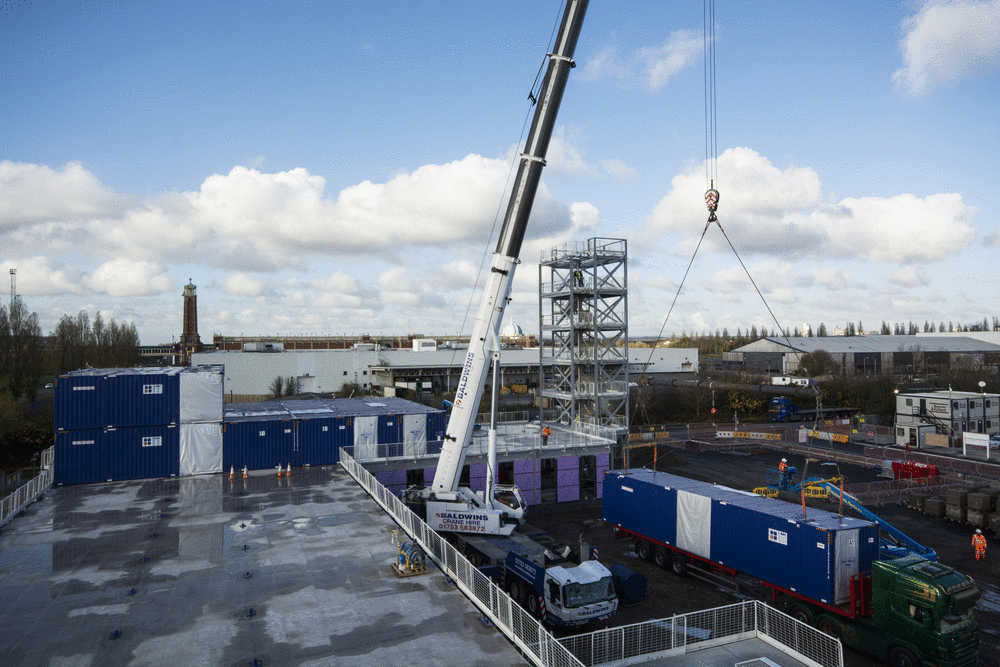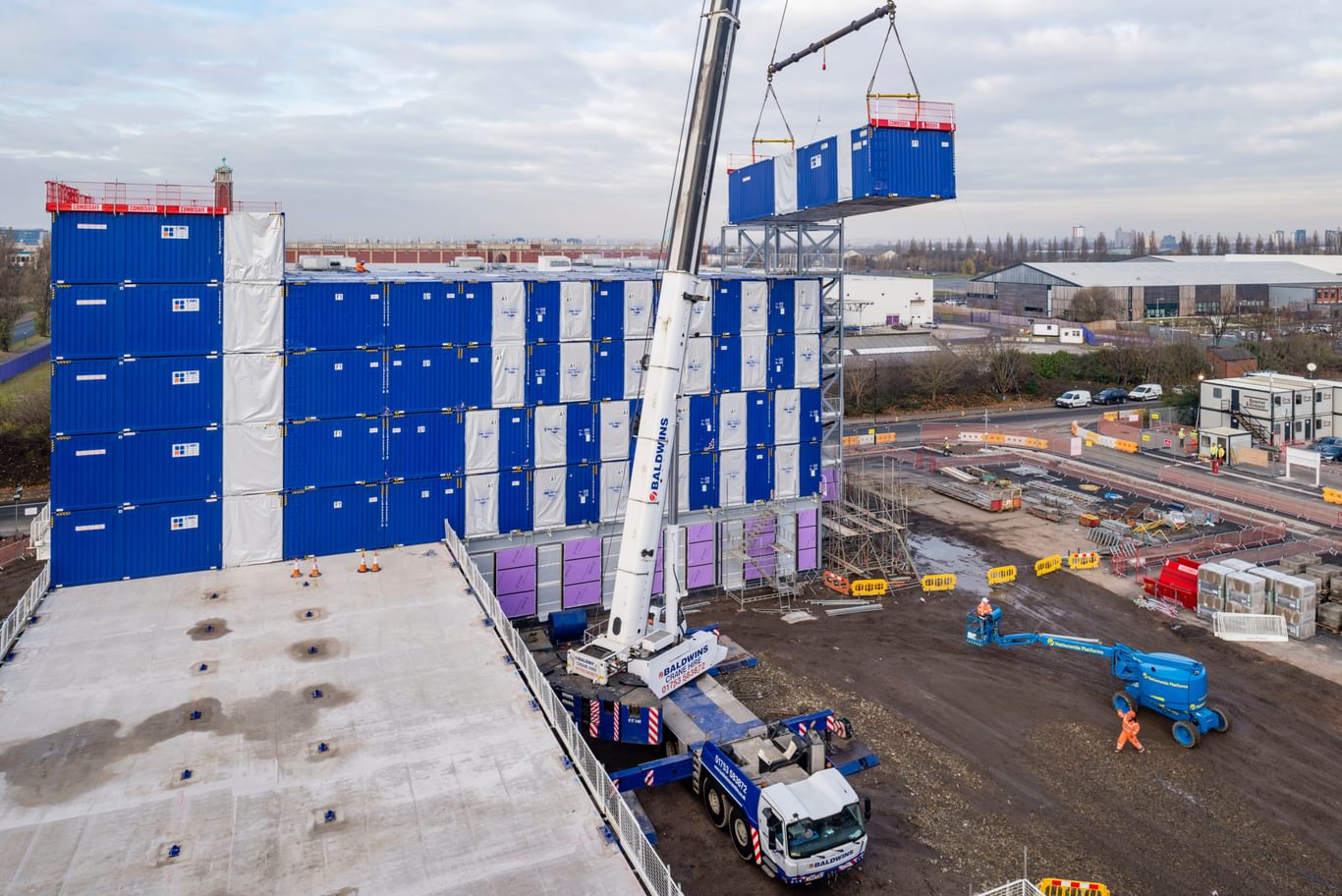
How can modular construction help our industry at a time of social distancing?
Beneficios de La construcción industrializada: El Distanciamiento Social y la Eficiencia Sostenible
As many countries begin to emerge from COVID-19-related lockdown into what has been called the “new normal”, clients are keen to understand more about modular construction and about how their project could benefit from this at a time when a need for social distancing makes on-site construction more challenging.
Chapman Taylor is convinced of the potential benefits of this exciting sector for designers, clients and end-users alike. We have pioneered development within the industry through the development of a range of off-site construction solutions, ranging from modular bathroom pods to full volumetric modular projects. You can read more about our experience and our thoughts in our Insight paper, “What is modular construction and why has Chapman Taylor embraced it?”
With volumetric modular construction, all the internal finishes within an enclosed room arrive completed, having been constructed off site to a higher degree of accuracy. This greatly reduces the number of people on site, which benefits construction sites as they look to incorporate social distancing measures.
Subsequent on-site activities are consequently less labour-intensive, meaning maintaining safe distances between workers becomes easier, while construction can continue safely at a time when traditional construction sites are closed.
Among the many other benefits we have seen from our work within the modular sector are the following:
- Large savings in terms of programme, waste and cost.
- The quality of the end product is consistently greater.
- The building’s elements can be constructed at greater speed in controlled conditions – if necessary, the process can continue 24/7 and involve finished products continuously rolling off the factory floor.
- The speed of the overall construction programme leads to earlier project completion. For some of the schemes we are involved with, this has been up to 50% quicker than a traditional programme.
- The manufacturing process within these factories encourages higher levels of Quality Assurance than construction sites, which in turn means greater monitoring and controlling of hygiene and health security procedures.
- The process is less susceptible to some of the external factors present in traditional builds, such as adverse weather, challenging site logistics, the industry’s skills shortage, etc.
- The factory process will often involve people specialising in one specific area to a very high standard, leading to a better quality of product.
- Waste can be significantly reduced with an off-site process – as much as 50% of waste on traditional building sites could be prevented by a switch to off-site construction, with all the attendant financial and environmental benefits.
- While, currently. it isn’t necessarily always cheaper to build off-site in the first instance, the financial benefits to the client then accrue in a number of ways over the medium-to-long-term.
- It can also lead to better environmental credentials – you are more likely to get a well-sealed and airtight system, allowing for a much more efficient energy performance once built and operational.
- With a hotel, a Build-to-Rent scheme or student accommodation, where space is effectively rented, the scheme can begin to generate income a lot earlier than usual because of the use of off-site methods.
- On the building contract side, the shorter construction programme means lower labour costs and reduced overheads. Investors get a return on their investment earlier, and the development team will save money on interest payments due to earlier loan repayments.
With our Holiday Inn Express modular hotel project in Trafford City, Manchester, it took just nine months from the start of the construction process on site to completion, saving six months of construction time compared to the traditional build programme. This resulted in the client avoiding six months’ worth of interest payments on loans and only paying the contractors for a relatively short amount of time on site. It also meant that they were able to start trading six months earlier, with all the associated revenue generation that brought about.
The client estimates that, taking all of these financial aspects into account, they saved approximately £1 million in construction costs when compared to a traditional form of construction, which is particularly impressive in the context of the overall project cost of £16.2 million.
Chapman Taylor has become a leading player within the off-site sector. Chapman Taylor’s Research and Development team has produced a trademark off-site modular housing model, called Umbrellahaus®, which can be constructed at scale and speed to provide much-needed community housing. We have also written Insight papers, spoken at off-site conferences and given presentations explaining the benefits of modular construction - all reflecting our view that off-site construction encourages greater collaboration and an excellent quality of end-product.
We think that, in order to address the industry’s capacity issue, particularly in terms of the housing shortage, but also in sectors such as hospitality, education and healthcare, volumetric modular construction has a key role to play in pushing the industry forward.
For more information about the benefits of modular construction, please contact:
LA NUEVA NORMALIDAD ES MÁS EFICIENTE, POR FIN:
Muchos países empiezan ya a emerger del confinamiento provocado por el COVID y comienzan la fase denominada de la nueva normalidad “new normal”, los clientes elevan el interés por entender mejor los procesos de la construcción modular y cómo los proyectos se pueden beneficiar considerablemente en este tiempo en el que el distanciamiento social ha mostrado que la construcción” in situ” sea cada vez algo más compleja.
Chapman Taylor es consciente desde hace algún tiempo del tremendo potencial que la industrialización de la construcción puede beneficiar a promotores, clientes y usuarios finales en múltiples procesos y sectores.
Hemos tenido la suerte de ser pioneros en esta industria a través de una amplia variedad de soluciones constructivas “off-site” híbrida o completamente prefabricada. Ejemplos de esto pueden ser elementos como los aseos modulares, fachadas de todo tipo o proyectos modulares completos. Sobre estos proyectos y nuestras conclusiones al respecto consultar en “What is modular construction and why has Chapman Taylor embraced it?”
With volumetric modular construction, all the internal finishes within an enclosed room arrive completed, having been constructed off site to a higher degree of accuracy. This greatly reduces the number of people on site, which benefits construction sites as they look to incorporate social distancing measures.
Subsequent on-site activities are consequently less labour-intensive, meaning maintaining safe distances between workers becomes easier, while construction can continue safely at a time when traditional construction sites are having to evaluate and significantly amend operations.
Among the many other benefits we have seen from our work within the modular sector are the following:
- Large savings in terms of programme, waste and cost.
- The quality of the end product is consistently greater.
- The building’s elements can be constructed at greater speed in controlled conditions – if necessary, the process can continue 24/7 and involve finished products continuously rolling off the factory floor.
- The speed of the overall construction programme leads to earlier project completion. For some of the schemes we are involved with, this has been up to 50% quicker than a traditional programme.
- The manufacturing process within these factories encourages higher levels of Quality Assurance than construction sites, which in turn means greater monitoring and controlling of hygiene and health security procedures.
- The process is less susceptible to some of the external factors present in traditional builds, such as adverse weather, challenging site logistics, the industry’s skills shortage, etc.
- The factory process will often involve people specialising in one specific area to a very high standard, leading to a better quality of product.
- Waste can be significantly reduced with an off-site process – as much as 50% of waste on traditional building sites could be prevented by a switch to off-site construction, with all the attendant financial and environmental benefits.
- While, currently. it isn’t necessarily always cheaper to build off-site in the first instance, the financial benefits to the client then accrue in a number of ways over the medium-to-long-term.
- It can also lead to better environmental credentials – you are more likely to get a well-sealed and airtight system, allowing for a much more efficient energy performance once built and operational.
- With a hotel, a Build-to-Rent scheme or student accommodation, where space is effectively rented, the scheme can begin to generate income a lot earlier than usual because of the use of off-site methods.
- On the building contract side, the shorter construction programme means lower labour costs and reduced overheads. Investors get a return on their investment earlier, and the development team will save money on interest payments due to earlier loan repayments.
Con la construcción modular volumétrica o industrialización 3D todos los detalles finales del interior de un espacio vienen integrados y acabados tras haber sido ensamblados off-site con una alta calidad en la precisión y en el control de la calidad. Esto además reduce de manera importante el número de personal requerido en la obra, otro factor de beneficio junto a la necesidad requerida hoy de distanciamiento social.
Las consiguientes actividades a realizar en el montaje son menos demandantes con lo que es más fácil mantener las distancias necesarias, la construcción modular puede avanzar con seguridad mientras que los métodos tradicionales de construcción deben ser ahora reevaluados con importantes ajustes en sus operaciones rutinarias.
BENEFICIOS GENERALES DE LA CONSTRUCCIÓN INDUSTRIALIZADA:
Entre los muchos beneficios que hemos aprendido de nuestra experiencia en construcción industrializada destacamos los siguientes:
- Ahorros significativos en cuanto a plazos, residuos y costes
- La calidad del proyecto final es consistentemente más alta
- Los distintos elementos del edificio pueden ser construidos en condiciones óptimas de control y rapidez, incluso si fuera necesario a un ritmo 24/7
- La disminución en el tiempo de construcción total del edificio es relevante, llegando en casos a acortar a la mitad el tiempo que hubiera implicado de manera tradicional.
- Dentro de los controles de fabricación se encuentran los más altos niveles de Seguridad y Calidad gracias al control continuo y monitorización de todo el proceso, incluyendo condiciones de higiene y seguridad.
- El proceso de construcción modular es menos susceptible a elementos externos de construcciones tradicionales como el clima, la logística del solar o la merma de capacidades en la industria.
- El proceso de industrialización involucrará trabajadores altamente preparados y especializados en sus tareas lo cual nos dará un producto final mejorado.
- Los residuos industriales se minimizan considerablemente frente al modo tradicional pudiendo llegar hasta a un 50% lo cual implica una mejora significativa en aspectos económicos y medioambientales
- Por el momento no es necesariamente más barato este modo de construir en estos momentos iniciales pero si a un medio y largo plazo en el tiempo así como por todos sus factores de sostenibilidad y calidad
- La industrialización consolida una mayor eficiencia energética mediante su control en todo momento.
- El ahorro de dinero y procesos financieros son considerables a la hora del proceso de los contratos sobre todo por el ahorro económico y de tiempos lo cual da mejores retornos de inversión
With our Holiday Inn Express modular hotel project in Trafford City, Manchester, it took just nine months from the start of the construction process on site to completion, saving six months of construction time compared to the traditional build programme. This resulted in the client avoiding six months’ worth of interest payments on loans and only paying the contractors for a relatively short amount of time on site. It also meant that they were able to start trading six months earlier, with all the associated revenue generation that brought about.
The client estimates that, taking all of these financial aspects into account, they saved approximately £1 million in construction costs when compared to a traditional form of construction, which is particularly impressive in the context of the overall project cost of £16.2 million.
Chapman Taylor has become a leading player within the off-site sector. Chapman Taylor’s Research and Development team has produced a trademark off-site modular housing model, called Umbrellahaus®, which can be constructed at scale and speed to provide much-needed community housing. We have also written Insight papers, spoken at off-site conferences and given presentations explaining the benefits of modular construction - all reflecting our view that off-site construction encourages greater collaboration and an excellent quality of end-product.
We think that, in order to address the industry’s capacity issue, particularly in terms of the housing shortage, but also in sectors such as hospitality, education and healthcare, volumetric modular construction has a key role to play in pushing the industry forward.
For more information about the benefits of modular construction, please contact:
LA INNOVACIÓN SOSTENIBLE SE LLAMA UMBRELLAHAUS
En nuestro proyecto para hotel modular Holiday Inn Express ubicado en Manchester, Inglaterra, desde el comienzo de la construcción hasta el final de obra transcurrieron tan solo 9 meses y se consiguió ahorrar 6 meses de fase de construcción si comparamos con el método tradicional. De esa manera el promotor pudo ahorrar medio año en tiempos, procesos, pagos, licencias derivadas de la duración misma de la obra y, por supuesto, pudieron abrir el hotel 6 meses antes de lo previsto de tal manera que el rendimiento de la inversión se activó antes de lo normal. Se calcula que en un proyecto de 15 millones de presupuesto el ahorro que ha implicado en su total la construcción industrializada ha sido aproximadamente de 1 millón.
Chapman Taylor se ha posicionado como un lider en proyectos off-site ya que dentro de su Departamento de Investigación Creativa se desarrolla desde hace años un modelo llamado Umbrellahaus® que puede ser construido dentro del amplio marco de la industrialización modular en distintos procesos y ámbitos residenciales y de usos mixtos para solucionar problemas de regeneración urbana, vivienda social, sector inmobiliario temporal, adaptable y flexible dando cabida a un sin fin de distintas soluciones que cumplen con criterios básicos de sostenibilidad, ahorro, seguridad sanitaria e inclusión social.
El concepto Umbrellahaus® además implica a todos los protagonistas de la familia inmobiliaria de una manera horizontal y colaborativa, desde promotores, diseñadores, consultores, proveedores y constructores, donde además el producto final esta totalmente controlado por el usuario final, un nuevo habitante más concienciado con nuestros entornos urbanos y rurales. Las posibilidades no solamente son amplias y eficientes, también son sostenibles dentro de una sociedad en constante cambio.
Umbrellahaus® responde al futuro presente de la construcción hoy, responde a diversos sectores alternativos de planeamiento urbano en general pero en particular es altamente eficiente en el mundo de la sanidad, de la educación, de la inversión para alquiler (build to rent), usos mixtos, paisajismo urbano comercial, deportivo o institucional,…entre otros. La arquitectura modular volumétrica es vital para dar ese paso tan necesario adelante en seguridad, costes y eficiencia que la industria de la construcción tradicional necesita en estos momentos.

